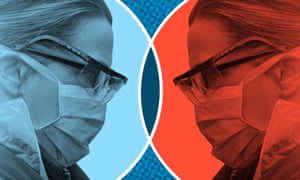In recent weeks, face masks have become an unremarkable sight in streets and supermarkets.
Many people are choosing to cover their mouth and nose with online-bought or homemade masks or scarves, in spite of the advice of the World Health Organization and, in the UK, from Public Health England, that they are no protection against coronavirus.
Yet one country after another has decided to depart from the WHO guidance and rule that masks should be worn – most notably the US.
To add to the confusion, on Monday, Sir Patrick Vallance, the UK government’s chief scientific adviser, said the UK position on masks was under review and would change if the scientific evidence warranted it.
This followed remarks by David Nabarro, a UN special envoy on Covid-19, who appeared to depart from the WHO’s line by suggesting the UK would have to get used to wearing masks.
“The virus isn’t going to go away and we don’t know if people who have had the virus stay immune afterwards,” he told the BBC, adding: “Yes, we will have to wear masks.”
Despite the mixed messages, the WHO guidance updated a week ago, has remained consistent.
It has stuck to the line that masks are for healthcare workers – not the public.
“Wearing a medical mask is one of the prevention measures that can limit the spread of certain respiratory viral diseases, including Covid-19. However, the use of a mask alone is insufficient to provide an adequate level of protection, and other measures should also be adopted,” it stated.

